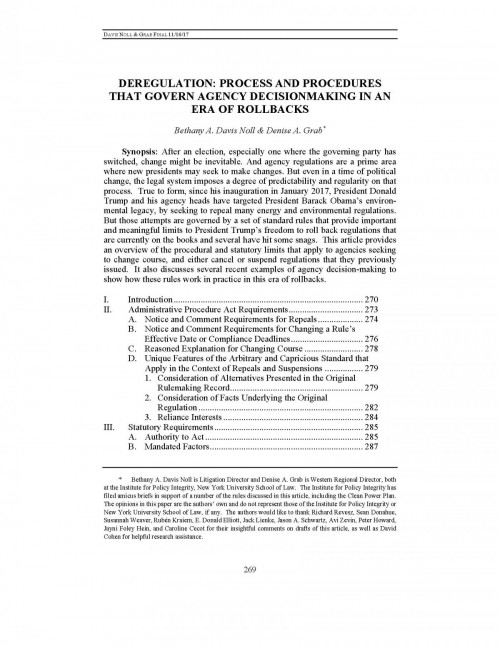-
Amicus Briefs on New York’s Zero Emissions Credits
Policy Integrity submitted two amicus briefs to the U.S. Court of Appeals for the Second Circuit on New York’s Clean Energy Standard and Zero Emissions Credits, defending the state’s policy.
-
Comments to FERC on the Southeast Market Pipelines project supplemental EIS
We submitted comments to the Federal Energy Regulatory Commission (FERC), along with partners, on the Commission’s failure to use the social cost of greenhouse gases in the Southeast Market Pipelines Project supplemental environmental impact statement. In addition to the joint comments, we also submitted a set of comments on FERC’s failure to conduct a full assessment of substitute energy sources.
-
The Environment in the Atomic Age
Scholars date the start of the “Anthropocene” period, during which human activity began to have substantial effects on the environment, variously from the beginning of human farming roughly 8,000 years ago to the emergence of industrialism in the 19th century. But all agree that the advent of nuclear weapons and power has dramatically changed the potential for environmental alterations. Our ongoing attempts to harness the benefits of the atomic age while lessening its negative impacts will need to confront the substantial environmental and public-health issues that have plagued nuclear technology since its inception.
-

Deregulation: Process and Procedures That Govern Agency Decisionmaking in an Era of Rollbacks
Though change might be inevitable when a new governing party comes to power, the United States’ legal system imposes a degree of predictability and regularity on that change. Since his inauguration in January 2017, President Donald Trump and his agency heads have been working to repeal many energy and environmental regulations issued under prior administrations. But these attempts are governed by a set of standard rules that limit President Trump’s freedom to roll back regulations. This article, published in the Energy Law Journal, provides an overview of the procedural and statutory limits that apply to agencies seeking to change course and cancel or suspend regulations that they previously issued. It also discusses recent examples of agency decision-making to show how these limits work in practice.
-
Comments to Highway Administration and Army Corps on Addressing Greenhouse Gas Emissions
We submitted comments to the Federal Highway Administration (FHWA) and the US Army Corps of Engineers (USACE) on recent draft environmental impact statements (EISs), in which we stressed the importance of addressing climate impacts of proposed projects.
-
Comments on the Federal Highway Administration’s Proposed Repeal of the Greenhouse Gas Measure
The Federal Highway Administration (FHWA) has announced its intention to repeal the greenhouse gas (GHG) measure, which is part of a series of rulemakings intended to ensure the most efficient investment of federal transportation funds. We submitted comments to the FHWA on the proposed repeal, highlighting that the Administration had failed to consider foregone benefits in its decision to finalize the repeal and failed to explain why the benefits of the measure no longer justify the costs.
-
Brief on HUD’s Suspension of Housing Voucher Reform
The Department of Housing and Urban Development (HUD) recently suspended a rule to increase the availability of affordable housing in higher-rent neighborhoods. Our amicus brief in a suit against HUD argues that the suspension violates administrative law by disregarding economic impacts and failing to first seek public feedback.
-
Comments on the Work Plan of the New York Carbon Pricing Task Force
The New York Independent Systems Operator (NYISO) and the New York Department of Public Service (DPS) recently began a joint effort to harmonize the state’s energy policies with the operation of wholesale markets, including by establishing a task force to discuss how to incorporate carbon pricing into the wholesale market. We recently submitted comments with a number of recommendations on how to ensure the task force’s work plan shapes the program in the most economically efficient and legally sound way. We suggested that price, revenue allocation, leakage, and harmonization with other state policies be included as topics in the work plan, among several others. We plan to continue to engage with this process over the next several months.
-
Comments on California’s Cap-and-Trade program
This summer, California passed Assembly Bill 398, extending the state’s well-regarded cap-and-trade program until 2030. The California Air Resources Board held a public workshop on October 12, 2017, on implementing the provisions of AB 398. The Board requested feedback on a number of specific issues to aid it in finalizing the cap-and-trade regulations, including on setting a price ceiling for emissions allowances and unsold allowance allocation. In our comments to the Board, we focused on these two issues, making recommendations for developing regulations under AB 398 that help ARB fulfill its statutory mandates to take into account the externalities associated with greenhouse gas emissions and promote overall societal well-being.
-
Reply Comments to FERC on Grid Reliability and Resilience Pricing
In September, Energy Secretary Perry asked the Federal Energy Regulatory Commission (FERC) to adopt a new rule that would guarantee plants with 90-day on-site fuel, mostly coal and nuclear plants, full cost recovery. We submitted an initial set of comments in response to their Notice Inviting Comments, and we have now submitted reply comments.





